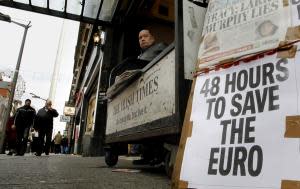 The Lookout
The LookoutWhat’s next in Irish debt crisis?

It looks like Ireland is slowly moving toward accepting a European Union bailout worth tens of billions of Euros, in an effort to end its debt crisis. So it's worth asking, how did things get to this point, and what's the upshot likely to be?
The root causes of Ireland's financial problems aren't so different from our own. During the 1990s and beyond, a rapid economic expansion earned the country the nickname "the Celtic Tiger." But cheap credit created a real-estate bubble, which, like ours, began to deflate in 2007. Major Irish banks — again like ours — soon found themselves overexposed to the real-estate sector. (You can read more about some of the individual culprits in the banking industry here.) The banks are still trying to manage those enormous losses.
So to avoid the risk of a complete collapse of the country's financial sector, such as what nearly happened in the United States in September 2008, the Irish government effectively nationalized the biggest banks, by guaranteeing their debt. But as more and more people fall behind on mortgage payments, the banks' — and therefore the government's — debts threaten to become unsustainable. That's prompted concern from other EU members — especially Spain and Portugal — that the crisis could destabilize the Euro and affect their own fragile economies. So pressure has been building on Ireland's government to accept a bailout.
Why has Ireland, until now, resisted accepting tens of billions of Euros from the EU? After all, Goldman Sachs, Bank of America, and co. hardly needed any convincing to take hundreds of billions of dollars from American taxpayers. The difference is that the Wall Street bailout came with very few strings attached (and no noticeable decline in the financial sector's clout ). In Ireland's case, by contrast, the EU — along with the International Monetary Fund and the European Central Bank — look almost certain to impose strict "austerity" conditions on any rescue plan, as they did when they bailed out Greece earlier this year.
That's something Ireland's government fears deeply, and for good reason. Not only would an austerity plan mean cutting essential public services; it would also likely force Irish leaders to raise the low corporate tax rate that since the 1990s has helped make the Emerald Isle a favorite of multinational businesses, especially tech firms such as Intel, Microsoft, and Facebook. If the tax rate goes up and the multinationals pull out, Ireland's economy would absorb much greater damage than it already has.
The irony here is that Ireland has already been severely tightening its belt ever since the economy began struggling two years ago, cutting its budget by a whopping 8.8 percent. And, despite the enthusiasm of elites for austerity on both sides of the Atlantic, it hasn't worked. The economy shrank 7.1 percent last year, and unemployment is over 13 percent.
So the expected bailout, given the strings that will almost certainly be attached, may only make it harder for Ireland to get back on track. But given the pressure from other countries and the EU, the Irish government appears to have decided it has no other option. IMF officials are said to have arrived at Ireland's finance department for more negotiations today.
(Photo: AP/Peter Morrison)
